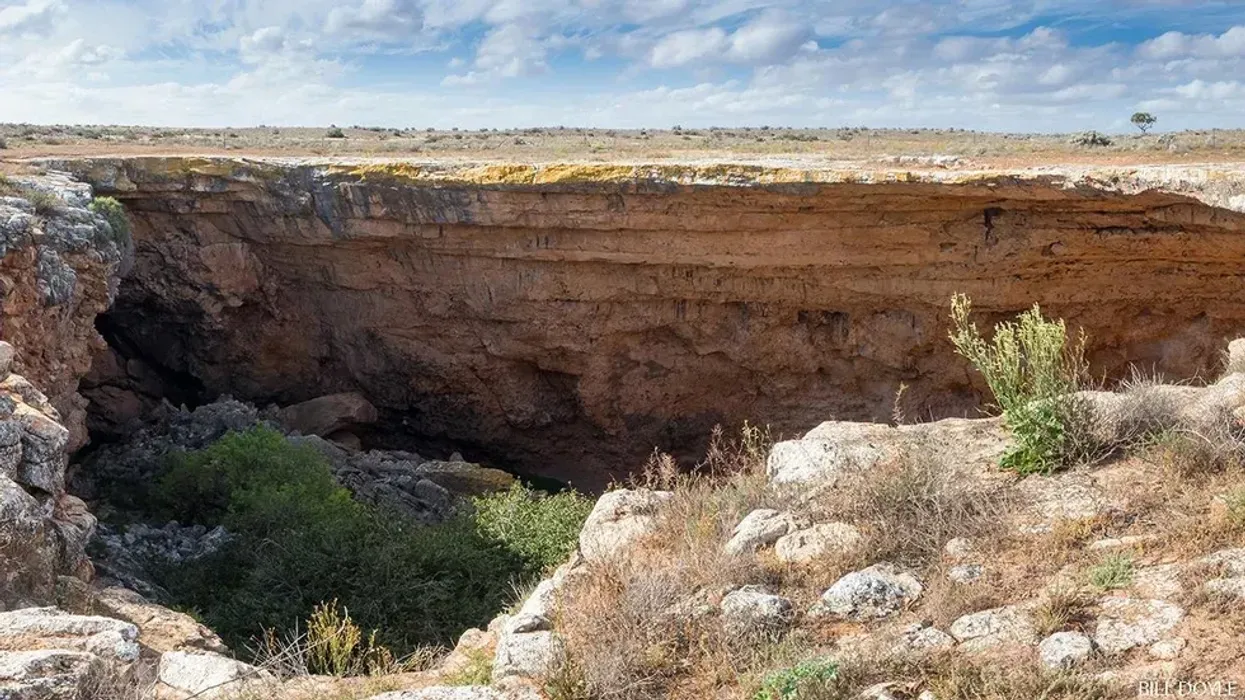(CNN) — In a flat, arid stretch of southern Australia, the Koonalda Cave is home to art that dates back 22,000 years — a sacred site for the indigenous Mirning People and a discovery that transformed scientists' understanding of history.
That protected cave and its art have now been vandalized with graffiti, devastating the indigenous Mirning community as authorities search for the culprits.
“Earlier this year it was discovered that the cave had been unlawfully accessed and a section of the delicate finger flutings had been vandalized, with damage scratched across them into the side of the cave,” a government spokesperson said in a statement to CNN.
The flutings are grooves drawn by the fingers of ice age humans across the soft limestone cave walls.
“The vandalism of Koonalda Cave is shocking and heartbreaking. Koonalda Cave is of significant importance to the Mirning People, and its tens of thousands of years of history show some of the earliest evidence of Aboriginal occupation in that part of the country,” the spokesperson said.
“If these vandals can be apprehended they should face the full force of the law.”
The vandals were not deterred by fences at the caves, so the South Australia state government is now considering installing security cameras and has been consulting indigenous leaders “over recent months” on how to better protect the site, the spokesperson added.
However, Bunna Lawrie, a senior Mirning elder and the custodian of Koonalda, said he hadn't heard about the vandalism until local media reported it this week.
“We are the traditional custodians of Koonalda and ask for this to be respected and for our Mirning elders to be consulted,” he said in a statement.
The incident has frustrated the Mirning People, who say their previous repeated requests for higher security went unheeded.
As a sacred site, it is closed to the public and only accessible to a few male elders in the community, the group said in a statement. Apart from the cave's spiritual significance, the restrictions are also to protect the delicate art, some of which is etched into the cave floor.
Despite the legal protections, the group said it has still received requests to allow public access to Koonalda.
“We have opposed opening our sacred place, as this would breach the protocols that have protected Koonalda for so long. Since 2018 we have been asking for support to secure the entrance as a priority and to offer appropriate Mirning signage. This support did not happen,” the statement said.
“Instead, there has been damage done in recent years that includes the cave entrance collapsing, following access works that we were not consulted on and [were] not approved.”
It added that as a site that represented the link to Mirning ancestors and home lands, Koonalda “is more than just a precious work of art, this runs deep in our blood and identity.”
Cave significance
For decades, Australian scientists believed the country’s indigenous people had only existed on the land for about 8,000 years.
Koonalda Cave was the first place in Australia with indigenous rock art that could be dated back 22,000 years — upending the scientific community’s understanding of Australian history.
“The discovery caused a sensation and forever changed the then accepted notions about where, when, and how Aboriginal people lived on the Australian continent,” said Greg Hunt, then-environment minister in 2014 when Koonalda was designated a National Heritage List site.
The cave art dating was assessed through archeological remains and finger markings, then confirmed using radiocarbon technology, according to the country’s Department of Climate Change, Energy, the Environment, and Water.
Apart from the finger flutings, the cave also had a second type of rock art, with lines cut into harder limestone sections using a sharp tool. The walls feature patterns of horizontal and vertical lines cut into a V-shape, according to a government site.
The cave and its art have been overseen and protected by Mirning elders for generations, the Mirning statement said.
“All of our elders are devastated, shocked, and hurt by the recent desecration of this site,” Lawrie said. “We are in mourning for our sacred place. Koonalda is like our ancestor. Our ancestor left his spirit in the wall, of the story, of the songline.”
The-CNN-Wire
™ & © 2022 Cable News Network, Inc., a Warner Bros. Discovery Company. All rights reserved.
- Native Food Drive Provides Traditional Meals to Indigenous Elders ›
- Marvel Vows to Change Comic Book Character After Backlash From Indigenous People ›
- Biden Administration to Issue Protections on Sacred Indigenous Lands in Nevada ›
- UC Berkeley Is Finally Repatriating Ancestral Remains to Indigenous Tribes ›

















































